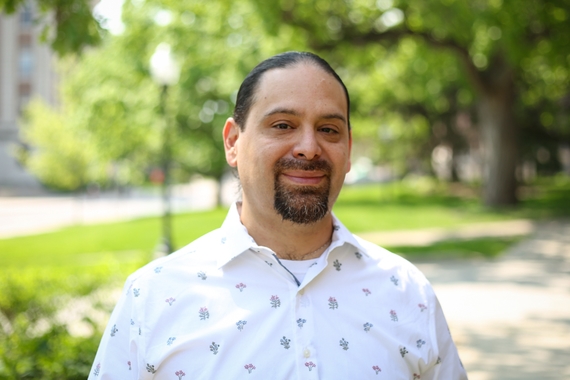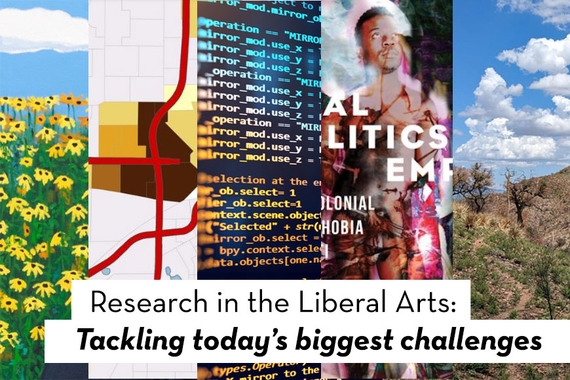Why Study Economics at the University of Minnesota?
“Economics asks some of the most important questions that societies can ask.” Joseph Mullins, assistant professor in economics at the University of Minnesota, believes there is little limit to the field’s potential to explore major social issues. His own research centers on inequality and human capital and explores “how differences in household backgrounds and policies and institutions can shape human abilities and therefore determine an individual's capacity for flourishing.” Mullins’ work is one of countless examples of how an economics degree can equip students to logically tackle critical social problems.
How would you describe economics as a discipline?
Economics is really the study of what I think are the most fundamental questions about how society should operate, but also how it does operate. I like to tell my students, "Markets are everywhere. Markets are just places where things are exchanged." Things are exchanged constantly, whether that's ideas or products or services or labor.
So economics is really about studying how these processes of exchange work, but also how these things combine together to produce social outcomes that we care about. Inequality in wealth, inequality in earnings, inequality in human capital, the capacity for human flourishing, these kinds of questions are central to economics generally.
What is special about studying economics at the University of Minnesota?
The University of Minnesota is a remarkable place and a very special place for studying economics. Our department has a rich and storied history through the 20th century. Many of the members of the department in the ‘70s and ‘80s were crucial figures in shaping how we think now about monetary policy and macroeconomic policy, or how governments should spend and control the money supply in order to dictate economic output and behavior.
Three of those professors went on to win Nobel Prizes in recognition of the work that they did around that time. That approach to attacking and understanding these problems is very much in the DNA of our department, and that level of intellectual rigor and cynicism towards accepted wisdom is something that we try to teach our students and make sure that they come away with when they learn economics from us.
Why is economics an important discipline?
I think the reason that economics is so important is because we take a lot of rigor and formal logic to the questions that we try to answer. Becoming an economist and learning the tools that we learn allows you to think critically about social problems and think deeply about what the unintended consequences might be of a particular intervention in a particular market.
Economics is unique as a social science in bringing mathematical rigor to the questions and logical rigor to the questions that are being asked. If you want to say that Policy X is going to have Effect Y, you have to tell me exactly the assumptions that you're making that are going to give you that conclusion. That's true both theoretically, but also when we go to the data and we bring our theories to the data. If every person in the world understood economics, I think that we would have much more productive discussions around policy decisions.
What is the focus of your research?
I focus a lot on the formation of human capital in early childhood. By human capital, we mean a set of abilities, capabilities, that allow for human flourishing, not just in the labor market, but in society more broadly. We know already that individual personalities and cognitive abilities are most malleable in early childhood, which means that the policies we design around how to provide financial support to households in poverty, how to provide free healthcare, how to provide childcare and public education… are enormously impactful on the entire life cycle of an individual.
My research focuses on how to design these programs. I've worked a lot on how to design cash transfers and welfare, and I have argued in my research that we've historically neglected the role that future human capital development has on what we think is an optimally designed welfare state. In my research, I find quantitatively that cash transfers or the safety net should both be more generous if we factor in the impact that resources today have on future human capital. But it might actually look different in terms of the work incentives that are put in place for receipt of cash transfers, because we also know that time with parents is also impactful on future human capital outcomes.
What experiential learning opportunities does the department provide for students?
We have a special program in the economics department, a research assistantship that's sponsored through our Heller-Hurwicz Economic Institute. Undergraduates apply for positions and work with faculty on research projects.
Currently, I employ three undergraduate research assistants. We're using the National Longitudinal Study of Youth to look at the impact of skills on earnings and criminal behavior. We're looking at how what we would call in economics the “returns to skills” differ by race and by gender [and whether] inherent or structural inequalities in society… shape the investment behavior of parents?
Returns to skills: the additional economic benefits or rewards that individuals receive as a result of acquiring and utilizing specific skills.
This is a taste of some of the research that you might end up doing through th[e Economics] program, but it's very close to the actual research that I do. I'm hopeful that this work will turn into something close to the frontier, something publishable, and the students are really hands-on with it. They do almost everything; I don't have time to do it for them. So it's very much a case of throw you in the deep end and hope that you figure it out, and it's a tremendous learning experience for them.
How does economics tackle some of society's biggest challenges?
When students enter our economics undergraduate major, they're learning what I truly believe to be the most important tools for thinking about society and the most important social problems that we face today, which [include]: How do we make the most of this incredible economic growth that we're enjoying? How do we redistribute the gains from this mostly free market that we enjoy? How do we ensure that all individuals have some opportunity for a flourishing life? Those are the questions that drive my energy for research.
What economics brings to the table is a set of rigorous, logically consistent tools for analysis of these problems along with cutting-edge quantitative tools to use data in answering those questions. The combination of these two things is what is especially powerful about economics, and it's both of these tools that students will learn.
Career Ready
As an economics student, you will develop ten core competencies to prepare you for your future career, including:
Comprehensively explore issues, ideas, knowledge, evidence, and values before accepting or formulating an opinion or conclusion.
- Recognize there may be more than one valid point of view.
- Evaluate an issue or problem based on multiple perspectives, while accounting for personal biases.
- Identify when information is missing or if there is a problem, prior to coming to conclusions and making decisions.
Design, evaluate, and implement a workable strategy to achieve a goal.
- Recognize constraints
- Generate a set of alternative courses of action
- Evaluate alternatives using a set of criteria
- Select and implement the most effective solution
- Monitor the actual outcomes of that solution
Leverage knowledge of information & communications technology and media literacies. Utilize the interpersonal skills necessary to succeed in a digital space.
- Assess sources of information
- Use technologies responsibly
- Adapt tools to new purposes
- Keep up with the evolving technology landscape
This story was edited by Max Pritchard, an undergraduate student in CLA.


